标签:fatal 元类 地址 最好 bad reason lse sign 返回
方法->底层会编译成消息->消息查找会使用递归查找
元类是一种虚拟的类,系统实现的,用来存储类对象的
对象分为:
1. 实例对象:存在类里面,
2. 类对象:存在元类里面
实例方法:
递归查找父类 -> 最终会查找到NSObject
如果没有实现就会进入动态方法解析
/***********************************************************************
* lookUpImpOrForward.
* The standard IMP lookup.
* initialize==NO tries to avoid +initialize (but sometimes fails)
* cache==NO skips optimistic unlocked lookup (but uses cache elsewhere)
* Most callers should use initialize==YES and cache==YES.
* inst is an instance of cls or a subclass thereof, or nil if none is known.
* If cls is an un-initialized metaclass then a non-nil inst is faster.
* May return _objc_msgForward_impcache. IMPs destined for external use
* must be converted to _objc_msgForward or _objc_msgForward_stret.
* If you don‘t want forwarding at all, use lookUpImpOrNil() instead.
**********************************************************************/
IMP lookUpImpOrForward(Class cls, SEL sel, id inst,
bool initialize, bool cache, bool resolver)
{
调用方法cls首先进来的是类对象。
IMP imp = nil;
bool triedResolver = NO;
runtimeLock.assertUnlocked();
// Optimistic cache lookup
if (cache) {
imp = cache_getImp(cls, sel);
if (imp) return imp;
}
// runtimeLock is held during isRealized and isInitialized checking
// to prevent races against concurrent realization.
// runtimeLock is held during method search to make
// method-lookup + cache-fill atomic with respect to method addition.
// Otherwise, a category could be added but ignored indefinitely because
// the cache was re-filled with the old value after the cache flush on
// behalf of the category.
runtimeLock.lock();
checkIsKnownClass(cls);
if (!cls->isRealized()) {
realizeClass(cls);
}
if (initialize && !cls->isInitialized()) {
runtimeLock.unlock();
_class_initialize (_class_getNonMetaClass(cls, inst));
runtimeLock.lock();
// If sel == initialize, _class_initialize will send +initialize and
// then the messenger will send +initialize again after this
// procedure finishes. Of course, if this is not being called
// from the messenger then it won‘t happen. 2778172
}
retry:
runtimeLock.assertLocked();
// Try this class‘s cache.
imp = cache_getImp(cls, sel);
if (imp) goto done;
// Try this class‘s method lists.
{
//首先判断类对象是否有这个方法
Method meth = getMethodNoSuper_nolock(cls, sel);
if (meth) {
log_and_fill_cache(cls, meth->imp, sel, inst, cls);
imp = meth->imp;
goto done;
}
}
如果自己没有这个方法,就会查找父类的method和caches里面是否有这个方法。
// Try superclass caches and method lists.
{
unsigned attempts = unreasonableClassCount();
for (Class curClass = cls->superclass;
curClass != nil;
curClass = curClass->superclass)
{ 如果父类不为nil(NSObject父类为nil),for循环查找父类,直到NSObject
// Halt if there is a cycle in the superclass chain.
if (--attempts == 0) {
_objc_fatal("Memory corruption in class list.");
}
// Superclass cache.
imp = cache_getImp(curClass, sel);
if (imp) {
if (imp != (IMP)_objc_msgForward_impcache) {
// Found the method in a superclass. Cache it in this class.
log_and_fill_cache(cls, imp, sel, inst, curClass);
goto done;
}
else {
// Found a forward:: entry in a superclass.
// Stop searching, but don‘t cache yet; call method
// resolver for this class first.
break;
}
}
// Superclass method list.
Method meth = getMethodNoSuper_nolock(curClass, sel);
如果找到了就缓存到chache里面,下次查找方便
if (meth) {
log_and_fill_cache(cls, meth->imp, sel, inst, curClass);
imp = meth->imp;
goto done;
}
}
}
// No implementation found. Try method resolver once.
如果都没有找到,就会走动态方法解析_class_resolveMethod
if (resolver && !triedResolver) {
runtimeLock.unlock();
_class_resolveMethod(cls, sel, inst);
runtimeLock.lock();
// Don‘t cache the result; we don‘t hold the lock so it may have
// changed already. Re-do the search from scratch instead.
triedResolver = YES;
goto retry;
}
// No implementation found, and method resolver didn‘t help.
// Use forwarding.
imp = (IMP)_objc_msgForward_impcache;
cache_fill(cls, sel, imp, inst);
done:
runtimeLock.unlock();
return imp;
}
动态方法解析
/***********************************************************************
* _class_resolveMethod
* Call +resolveClassMethod or +resolveInstanceMethod.
* Returns nothing; any result would be potentially out-of-date already.
* Does not check if the method already exists.
**********************************************************************/
void _class_resolveMethod(Class cls, SEL sel, id inst)
{
首先判断是元类吗?目的是区服是对象方法还是类方法(对象方法存在类里面,类方法存在元类里面)
if (! cls->isMetaClass()) {
// try [cls c]
_class_resolveInstanceMethod(cls, sel, inst);
}
else {
// try [nonMetaClass resolveClassMethod:sel]
// and [cls resolveInstanceMethod:sel]
_class_resolveClassMethod(cls, sel, inst);
if (!lookUpImpOrNil(cls, sel, inst,
NO/*initialize*/, YES/*cache*/, NO/*resolver*/))
{
_class_resolveInstanceMethod(cls, sel, inst);
}
}
}
/***********************************************************************
* _class_resolveInstanceMethod
* Call +resolveInstanceMethod, looking for a method to be added to class cls.
* cls may be a metaclass or a non-meta class.
* Does not check if the method already exists.
**********************************************************************/
static void _class_resolveInstanceMethod(Class cls, SEL sel, id inst)
{
查找当前cls的isa->原类是否实现了resolveInstanceMethod
if (! lookUpImpOrNil(cls->ISA(), SEL_resolveInstanceMethod, cls,
NO/*initialize*/, YES/*cache*/, NO/*resolver*/))
{这一步的目的就是查找是否混乱,防止错误,因为最终会查找到NSObject里面的resolveInstanceMethod:实现,如果的父类里面都没有实现resolveInstanceMethod那么也就没有查找下去的必要性了,如果NSObject里面都没有resolveInstanceMethod,证明这个程序是有问题的,所以直接返回就好了,没有必要进行下层的动态方法解析流程。
// Resolver not implemented.
return;
}
如果上面都没有问题,那么就进行objc_msgSend
BOOL (*msg)(Class, SEL, SEL) = (typeof(msg))objc_msgSend;
bool resolved = msg(cls, SEL_resolveInstanceMethod, sel); 返回你的自定义动态方法解析的bool值
// Cache the result (good or bad) so the resolver doesn‘t fire next time.
// +resolveInstanceMethod adds to self a.k.a. cls
IMP imp = lookUpImpOrNil(cls, sel, inst,
NO/*initialize*/, YES/*cache*/, NO/*resolver*/);重新递归查找sel的imp,所以说汇编之后就会进行漫长的查找过程
if (resolved && PrintResolving) {
if (imp) {
_objc_inform("RESOLVE: method %c[%s %s] "
"dynamically resolved to %p",
cls->isMetaClass() ? ‘+‘ : ‘-‘,
cls->nameForLogging(), sel_getName(sel), imp);
}
else {
// Method resolver didn‘t add anything?
_objc_inform("RESOLVE: +[%s resolveInstanceMethod:%s] returned YES"
", but no new implementation of %c[%s %s] was found",
cls->nameForLogging(), sel_getName(sel),
cls->isMetaClass() ? ‘+‘ : ‘-‘,
cls->nameForLogging(), sel_getName(sel));
}
}
}
/***********************************************************************
* lookUpImpOrNil.
* Like lookUpImpOrForward, but returns nil instead of _objc_msgForward_impcache
**********************************************************************/
IMP lookUpImpOrNil(Class cls, SEL sel, id inst,
bool initialize, bool cache, bool resolver)
{
查找原类对象是否有这个sel这个方法,又会调用lookUpImpOrForward递归查找是否有实现,这样可能会形成死循环,系统处理方式是在NSObject实现了这个类方法下面有源码截图
IMP imp = lookUpImpOrForward(cls, sel, inst, initialize, cache, resolver);
if (imp == _objc_msgForward_impcache) return nil; 如果是消息转发的imp就返回nil
else return imp; 如果找到了就返回imp
}
NSObject里面默认实现了这两个方法:(这样就不会形成方法动态解析死循环)
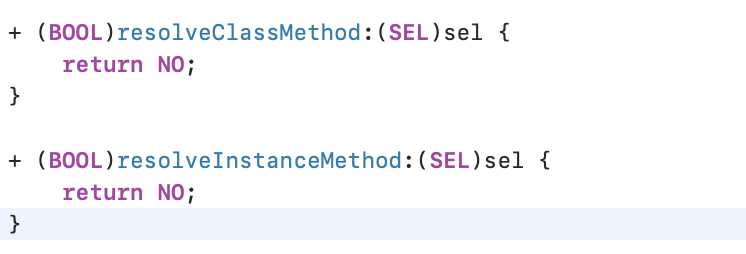
返回YES说明你已经对方法动态解析做了处理,如果返回NO说明要继续到下层处理。
+ (BOOL)resolveInstanceMethod:(SEL)sel {
//系统会自动发送消息 来到这里
NSLog(@"来了 老弟 - %@",self);
if (sel == @selector(run)) {
// 我们动态解析我们的 对象方法
// NSLog(@"对象方法 run 解析走这里");
SEL runSEL = @selector(run);
Method runM= class_getInstanceMethod(self, runSEL);
IMP runImp = method_getImplementation(runM);
const char *type = method_getTypeEncoding(runM);
return class_addMethod(self, sel, runImp, type); 这里只是返回了一个添加成功,但是并没有返回imp,原因是系统会通过sel再找一次imp
}
return [super resolveInstanceMethod:sel];
}
动态解析方法的实质 通过 sel 查找 imp,系统在崩溃之前会查找下resolveInstanceMethod方法,你有没有处理给没有imp的sel添加imp,如果你添加处理了,系统会再次重新查找imp方法,程序正常执行。
下面是类方法动态解析:
发现一个问题,在调用类的类方法,在分类里面实现同名实例方法,程序不会崩溃(并且不会走类方法动态解析)。
类方法 -> 首先递归找自己 -> 然后找父类 (如果没找到走动态解析)
对象方法的存储在类
类方法的存储在元类
类方法首先查找元类里面的对象方法
验证了类方法和原类实例方法是同一个方法(地址相同):
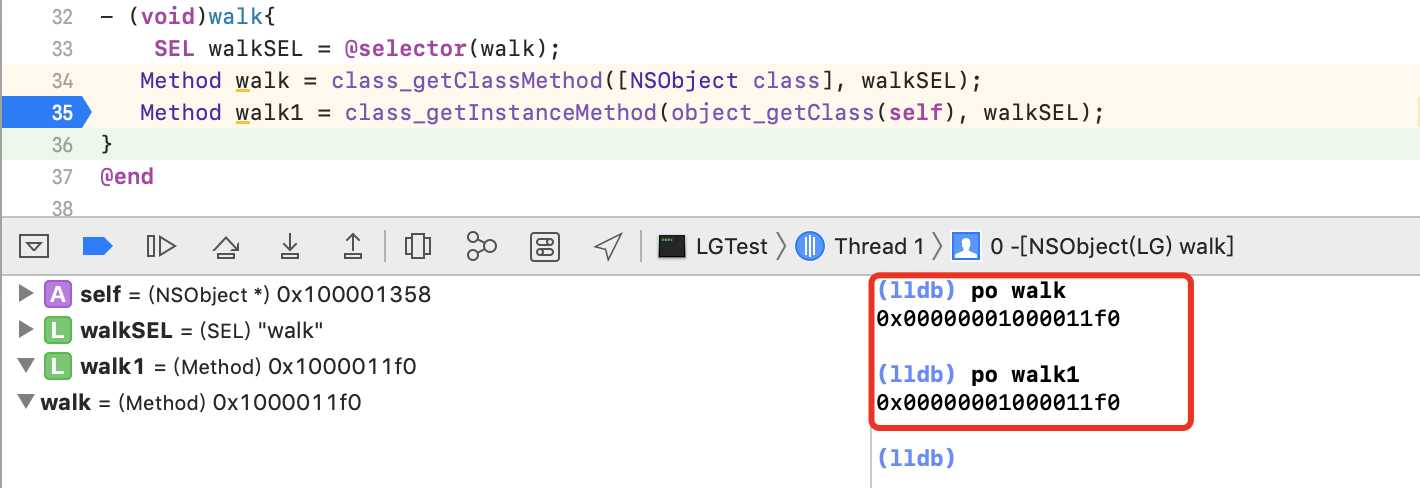
源码:发现类方法其实里面重新调用了从元类里面去实例方法(与之前预测相符)
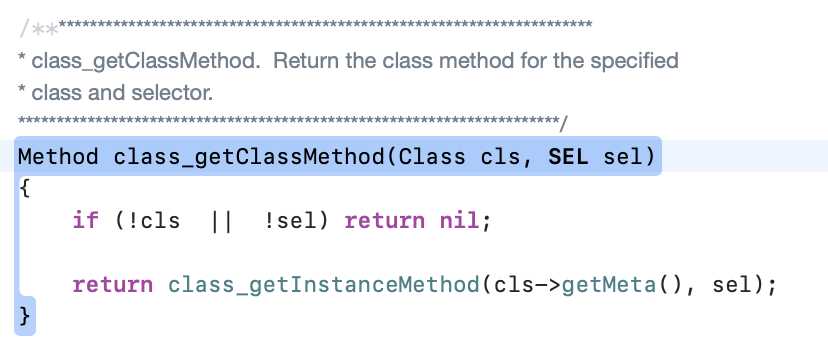
单步调试分类里面实现与类方法同名的单例方法程序不崩溃原因:
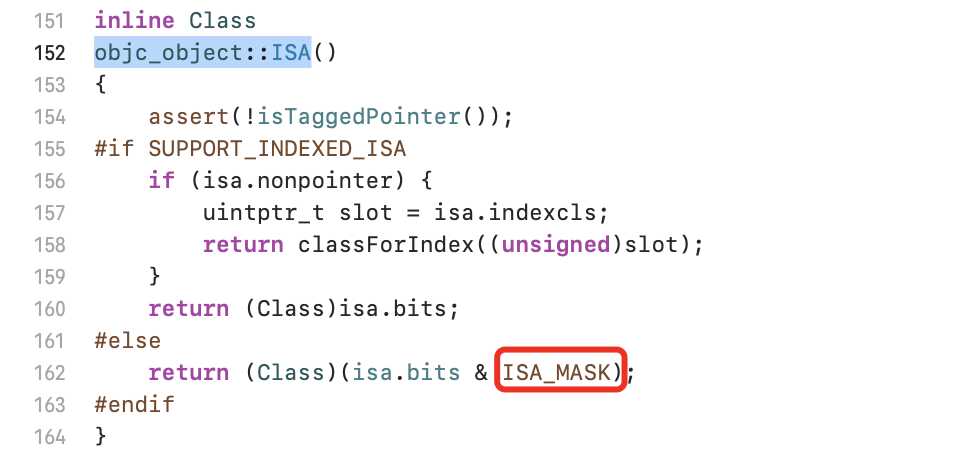
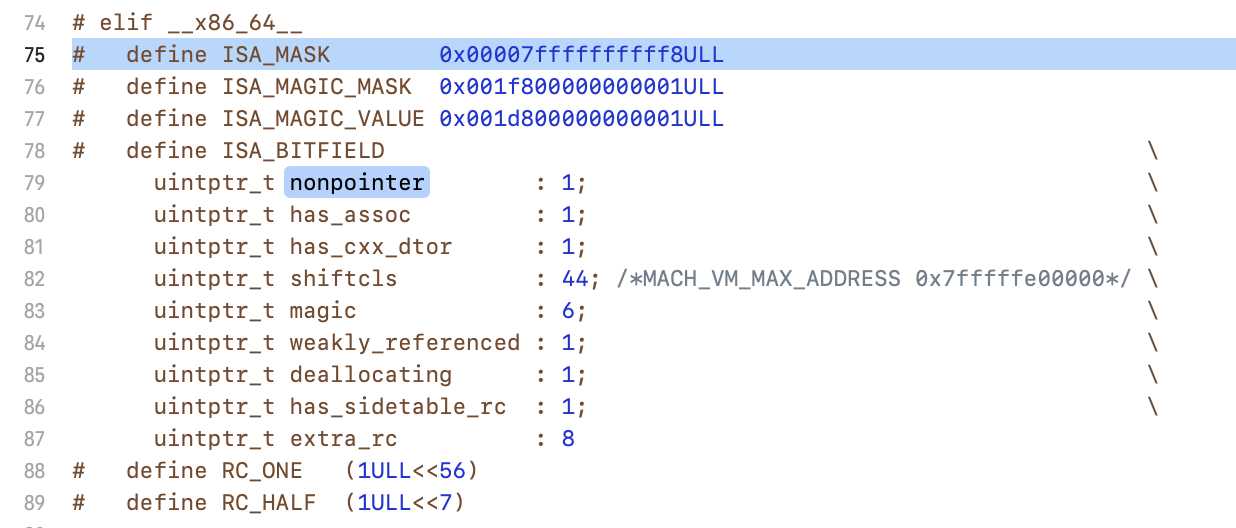
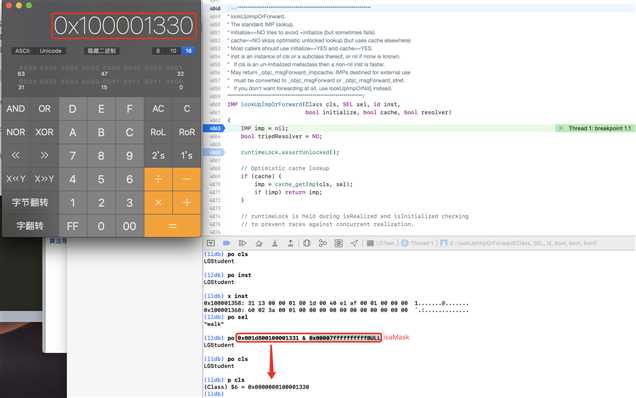
在查找walk类方法过程中,会查找元类->根元类->NSObject,直到NSObject类是否有walk实例方法,因为NSObject的类有分类walk实例方法所以不会崩溃。和对象方法查找有一点不一样。

类方法可以在NSObject里面以类方法和对象方法实现,但是最好是以类方法实现,以类方法实现的话会少找一层。
因为根类NSObject的类方法是存储在根元类里面,所以在找到根元类的时候就找到了方法,不会再去NSObject的类方法列表里去查找
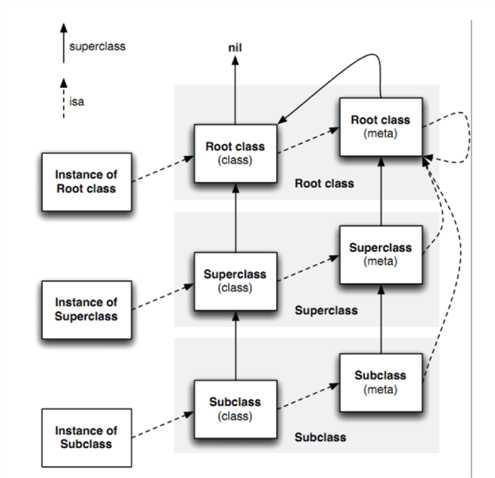
标签:fatal 元类 地址 最好 bad reason lse sign 返回
原文地址:https://www.cnblogs.com/coolcold/p/12184806.html